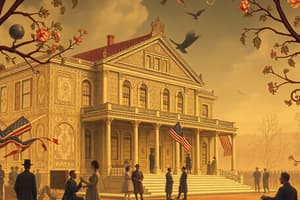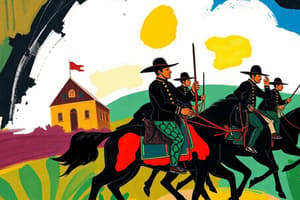Podcast
Questions and Answers
What is Reconstruction?
What is Reconstruction?
The period after the Civil War in the United States when the southern states were reorganized and reintegrated into the Union.
What was Special Field Order 15?
What was Special Field Order 15?
Sherman's response to meeting with black leaders, set aside a large area of South Carolina and Georgia coasts for black families to settle with 40 acres of land and broken-down mules.
What role did black churches play during Reconstruction?
What role did black churches play during Reconstruction?
They were mostly Methodist and Baptist, with 250 black ministers in office during this period.
Which of the following were the first black colleges established during Reconstruction? (Select all that apply)
Which of the following were the first black colleges established during Reconstruction? (Select all that apply)
What does 'freedom to former slaves' refer to?
What does 'freedom to former slaves' refer to?
What was the number of Confederate men deaths during the Civil War?
What was the number of Confederate men deaths during the Civil War?
How did Southern farming change post-Civil War?
How did Southern farming change post-Civil War?
Who led the Freedmen's Bureau?
Who led the Freedmen's Bureau?
Who was Andrew Johnson?
Who was Andrew Johnson?
What was the task system?
What was the task system?
What is wage labor?
What is wage labor?
What are sharecroppers?
What are sharecroppers?
What were Johnson's pardons?
What were Johnson's pardons?
What were the Black Codes?
What were the Black Codes?
Who were the Radical Republicans?
Who were the Radical Republicans?
What was the Civil Rights Act of 1866?
What was the Civil Rights Act of 1866?
What did the 13th Amendment accomplish?
What did the 13th Amendment accomplish?
What does the 14th Amendment declare?
What does the 14th Amendment declare?
What is the purpose of the 15th Amendment?
What is the purpose of the 15th Amendment?
What was The Reconstruction Act?
What was The Reconstruction Act?
What did the Tenure of Office Act do?
What did the Tenure of Office Act do?
Who was Ulysses S. Grant?
Who was Ulysses S. Grant?
What does 'waving the bloody shirt' refer to?
What does 'waving the bloody shirt' refer to?
What is the Naturalization Law?
What is the Naturalization Law?
Who were carpetbaggers?
Who were carpetbaggers?
What are scalawags?
What are scalawags?
Who opposed Reconstruction?
Who opposed Reconstruction?
What was the Whiskey Ring?
What was the Whiskey Ring?
What was the purpose of the Ku Klux Klan?
What was the purpose of the Ku Klux Klan?
What did the Enforcement Acts do?
What did the Enforcement Acts do?
Who were the Liberal Republicans?
Who were the Liberal Republicans?
What was Lincoln's plan for Reconstruction?
What was Lincoln's plan for Reconstruction?
What records were kept at Barrow Plantation?
What records were kept at Barrow Plantation?
Flashcards are hidden until you start studying
Study Notes
Reconstruction Era
- Reconstruction signifies the period post-Civil War focused on reorganizing and reintegrating Southern states into the Union.
- "40 acres and a mule" refers to Special Field Order 15, which aimed to provide land to 40,000 freed slaves.
Black Community Developments
- Black churches played a pivotal role during Reconstruction, predominantly being Methodist and Baptist, with 250 black ministers in leadership roles.
- The establishment of first black colleges, including Fisk University, Hampton Institute, and Howard University, marked a significant educational advancement for the African American community.
Freedmen's Rights and Challenges
- Freedom for former slaves was an ongoing transformation, impacting all facets of life and society from the previous era of slavery.
- The Freedmen's Bureau (1865-70) provided crucial support to freedmen through legal, educational, and housing assistance.
Losses and Economic Impact
- Approximately 260,000 Confederate men died in the war, representing about one-fifth of the Southern white male population.
- Southern agriculture faced significant challenges, including a 30% decrease in property values and the loss of significant investments.
Political Landscape Post-Civil War
- Andrew Johnson, Lincoln's VP, assumed the presidency after Lincoln's assassination and was known for his racist views, reversing policies like Sherman’s land provisions.
- The task system allowed workers to complete daily assignments and gain personal time afterward, while wage labor was prevalent on sugar plantations.
Legislative Framework
- Black Codes were established to limit newly freed slaves' rights, allowing marriage and property ownership but restricting legal rights against whites.
- The Radical Republicans, led by figures such as Charles Sumner and Thaddeus Stevens, advocated for black suffrage and harsh reconstruction policies.
Constitutional Amendments
- The 13th Amendment abolished slavery, while the 14th Amendment granted citizenship and equal protection under the law.
- The 15th Amendment asserted that voting rights could not be denied based on race or former servitude.
Reconstruction Acts and Political Opposition
- The Reconstruction Act divided the South into five military districts and enforced the 14th Amendment for states to be re-admitted.
- Johnson’s pardons restored rights to former Confederates, leading to opposition from Northerners.
Corruption and Opposition
- The Whiskey Ring scandal during Grant's presidency involved officials evading taxes, cheating the treasury.
- Ku Klux Klan emerged as a terrorist organization targeting black individuals and various minority groups, sustaining white supremacy through violence.
Reform Movements
- The Liberal Republicans arose in 1872 in response to corruption within the Grant administration, nominating Horace Greeley for president.
- Johnson’s administration faced backlash from both Southern Democrats and new government structures, indicating a deep political divide.
Economic Dynamics and Social Issues
- Carpetbaggers were Northerners who moved South to exploit opportunities post-war, while scalawags were Southern individuals cooperating with Northern interests.
- Barrow Plantation detailed records of slave whippings, signifying the brutality of plantation life, with significant documentation of abuses.
Campaign Strategies
- "Waving the bloody shirt" was a tactic used to remind voters of Confederate actions, diverting attention from the competence of candidates or pressing issues.
Studying That Suits You
Use AI to generate personalized quizzes and flashcards to suit your learning preferences.




